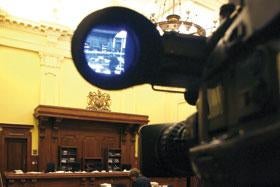
Cameras should be allowed into courts to cover events such as sentencing in criminal cases, judges’ closing remarks and the delivery of judgments, according to the Director of Public Prosecutions.
The comments were made by Keir Starmer QC at a lunch hosted by the Parliamentary and Legal committee of the Society of Editors.
Asked by society director Bob Satchwell whether he supported proposals to televise sentencing, judges’ closing remarks and judgments, he said:
“In principle I would support a proposal that judgments, judges’ closing remarks and judicial sentencing in criminal cases could be televised.
“There may be a case for going further, although I would obviously not want to promote anything that adversely affected the ability of victims or witnesses to give their best evidence to the court.
“Therefore there would need to be appropriate safeguards, particularly in cases involving vulnerable individuals, and any requests to televise any part of the court process should be subject to the judge’s individual discretion.
“But I think that there should be a presumption of openness in showing certain parts of a trial.
“I believe that transparency and visibility help the public understand how the criminal justice system works, and shining a light on the workings of the court room can only serve to boost its efficiency and effectiveness.”
In December last year John Ryley, head of Sky News, called on political parties to support reforms to allow television cameras into courts.
Televising proceedings such as the cases of MPs and a Peer facing trial on charges of fiddling their Parliamentary expenses would help restore faith in the criminal justice process, he said in an article in The Guardian.
Although the judge at the hearing at which former MP David Chaytor pleaded guilty had described the case as “a matter of intense public interest”, the law did not allow the wider public to see the proceedings as television cameras were banned, Ryley wrote.
As well as a loss of confidence in parliament and politicians, the justice system itself suffered, with judges being seen by critics as “out of touch” and “liberal” he claimed.
It was, he said, a key requirement of English common law that most discussions took place in open court, in front of a public gallery.
“By allowing cameras into court the public can decide for themselves whether a judge is fair or a witness credible,” he wrote. The sheer length of the proceedings will serve as a reminder that simplified reports in the papers and news bulletins cannot reflect the complexity of a trial.”
Cameras. including video cameras, are banned from courts by section 41 of the Criminal Justice Act 1925.
The Government has for some time been considering the issue of cameras in courts, but has not yet put forward any proposals.
Email pged@pressgazette.co.uk to point out mistakes, provide story tips or send in a letter for publication on our "Letters Page" blog

